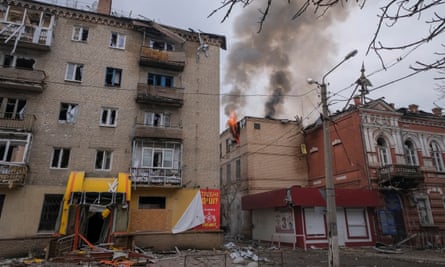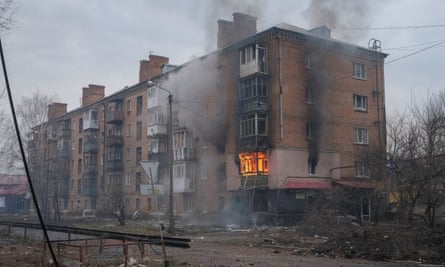In the besieged city of Bakhmut in eastern Ukraine, the volunteers collecting the civilian dead risk becoming casualties themselves. “Where? Where?” demands Daniel Wilk, a Canadian driver, in shaky video footage shot recently inside the city and seen by the Guardian.
Wilk proceeds quickly, the anxiety of the situation visible in his movements as he is directed to a fence, cutting an uncertain path across the snow as another voice cries “no, no” repeatedly.
The bodies, when Wilk gets to them, have been cut in half by the force of the explosion that took their lives, and still lie where they fell three days before. Quickly they are bundled up in a sheet to be removed.
People who have managed to reach Bakhmut in the past week use the same word to describe what they have experienced: hell.
As flames and smoke ring into the sky from blazing buildings, the city, almost totally encircled by Russian forces, has been raked by constant gunfire and explosions in recent days.
With roads leading to the city under constant fire from two sides, and with snipers in the streets, accessing the city has become ever more perilous for rescue teams, as speculation has mounted that Ukrainian forces will have to withdraw.
“We haven’t been able to reach the downtown area in recent days,” said Olha Danilova, who like Wilk works for a Ukrainian NGO, Dobryi Rukh, which has been working in Bakhmut for all of the seven months of the Russian assault.
“The closest we could get was 500 metres from the city centre. It’s very loud. Everything is being shelled with mortars. It’s inaccessible. We were trying evacuate civilian from down by the river last time. We couldn’t even get close.
“The main road we used to use is being shelled constantly. The 27th [of February] was the worst. That was the hell day. It was the hardest day we’ve had since we’ve been working here. It was a wall of fire. Two walls of fire. It was coming from all sides, and aviation was attacking.”

“It was super difficult,” Wilk added. “If you try go down the main road, someone is going to try and kill you. There are snipers in the street shooting civilians. They don’t give a fuck. It’s complete carnage.
“I’ve been all over the city. There are still some bits that almost look normal for a Donbas town. The rest is completely devastated. The last time I drove in, I counted six plumes of smoke. There are fires everywhere.”
In a week in which the situation for Bakhmut’s defenders has become almost untenable, Danilova and Wilk’s accounts, and those of other civilian volunteers who spoke to the Guardian, paint a vivid picture of a city that many fear could soon fall to the Russians.
A bleak tone has crept into the social media updates of even some of the city’s most unflappable defenders, including “Magyar”, a drone unit commander celebrated for his efforts.
“All you need to know is as of March 1, Bakhmut still stands,” he said, his expression flat and exhausted. “The price of holding it is supreme. And it is getting harder and harder to hold it,” he added, mentioning Russian efforts to cut the last supply lines to the city.
In recent days, even amid reports of a surge of Ukrainian reinforcements to the area, forces have struggled to repel Russian advances to the north and south of the city.
With supply roads now under heavy fire by Russian artillery, including phosphorus munitions and anti-tank guided missiles, the long, slow encirclement that has cost the lives of thousands of Russian soldiers is choking the last access.

“Our military is obviously going to weigh all of the options. So far, they’ve held the city, but if need be, they will strategically pull back,” Alexander Rodnyansky, an economic adviser to President Volodymyr Zelenskiy, said earlier this week. “We’re not going to sacrifice all of our people just for nothing.”
A battle that has come to embody Ukraine’s determination, as the city’s defenders hold out against relentless shelling and Russian troops take heavy casualties, may be winding to an end.
Yet even then, while analysts believe the fall of Bakhmut would be a blow for Ukraine – and a propaganda victory for the Kremlin – its capture would offer little real strategic advantage to Russia.
Rodnyansky noted that Russia was using the Wagner group’s best troops to try to encircle the city. The private military company known for brutal tactics is led by Yevgeny Prigozhin, a millionaire with longtime links to Vladimir Putin.
Prigozhin said on Wednesday that he had seen no signs of a Ukrainian withdrawal and that Kyiv had in fact been reinforcing its positions.
“The Ukrainian army is deploying additional troops and is doing what it can to retain control of the city,” he said. “Tens of thousands of Ukrainian soldiers are offering fierce resistance, and the fighting is getting increasingly bloody by day.”
Ukraine’s deputy defence minister, Hanna Maliar, said earlier this week that reinforcements had been dispatched to Bakhmut.
Oleh Zhdanov, a Ukrainian military analyst, said the reinforcements may have been sent to gain time for strengthening Ukrainian firing lines on a hill in Chasiv Yar, about 9 miles (15km) west of Bakhmut.
He said any possible withdrawal of Ukrainian forces from Bakhmut “will not affect the course of the war in any way” because of the firing positions in Chasiv Yar.

 1 year ago
127
1 year ago
127










 English (US)
English (US)